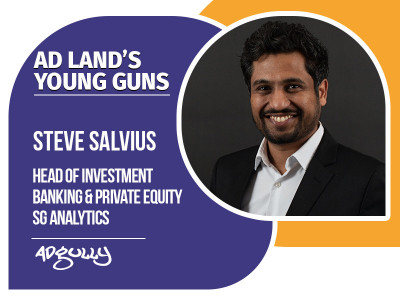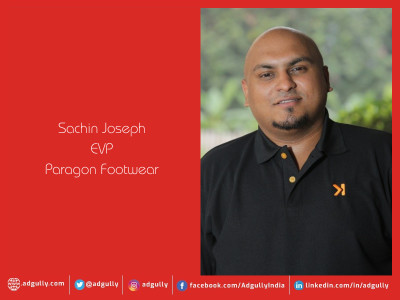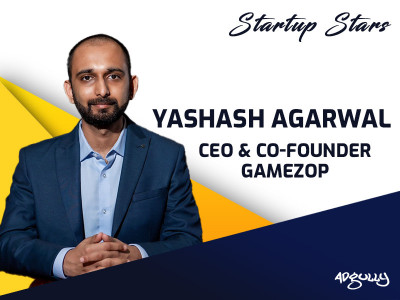Ad Lands Young Guns: Steve Salvius, Head of Investment Banking & PE, SG Analytics
Steve Salvius is the Head of Investment Banking & Private Equity of SG Analytics, a 17+-year-old research and analytics firm that focuses on harnessing the power of data with purpose. Salvius has over 15 years of experience in investment banking and private equity space in the US, Europe, and the Middle East. Before joining SG Analytics, he led one of the sector groups at UBS's India captive.
In an interaction with Adgully, Steve Salvius, Head of Investment Banking & Private Equity, SG Analytics, talks about his current roles as well as some common challenges that young professionals face when starting their careers in investment banking.
Could you share about your own career journey. How did you join your current role as the Head of Investment Banking at SG Analytics?
I started my career in the Investment Banking (IB) division of UBS. As they say – your first job, your first mentor, and your colleagues set up the foundation for your entire career. I was lucky to be surrounded by some of the sharpest minds in the industry. Looking back, I believe the strenuous working hours and the high-pressure deadlines early in my career instilled discipline, a strong work ethic, and the drive to motivate and grow with my team.
I joined SG Analytics (SGA) nine years ago in search of a new challenge and with the aim of building SGA’s expertise in the investment banking space. Even though we were just a two-person team at the time, I had already envisioned myself as the Head of IB. I was so glued to this vision that my manifestation came true, eventually. Over the years, I wore multiple hats – leading operations, sales, business development, and marketing to make IB the fastest-growing division in SGA.
What do you find most exciting and fulfilling about working in the investment banking field. What inspired you to pursue this career path?
The fascinating aspect about IB is that you get to meet founders, entrepreneurs, and C-level executives. You get opportunities to learn from them, be inspired by their journey, and work with them.
Back in college, I was one of those who lacked clarity about what they wanted to pursue as a career. I didn’t choose IB; rather, it chose me. It was through a campus placement that I entered the IB world. I enjoyed my learning during this phase and gave it my best once I entered the field.
What are some of the key skills or attributes that you believe are crucial for young professionals looking to excel in the world of investment banking?
I believe IB is half of finance and half of marketing, contrary to popular belief that it is hard-core finance. As much as one needs an analytical mind and an inclination for number crunching, one also needs to be good at storyboarding, positioning, and marketing the company. The key is to have good technical skills combined with a knack for connecting with people.
In your experience, what are some common challenges that young professionals face when starting their careers in investment banking, and how can they overcome them?
IB is one of the most demanding jobs due to its long working hours, high-pressure deadlines, and the need to frequently navigate complex situations. The IB world believes that the best way to train young professionals is to coach them through this grueling process. Unfortunately, it is during this process that a lot of youngsters and newcomers give up. I believe the way forward is to not give up but to believe in the process; life will be rewarding and fulfilling once you are through the initial years of this intense training.
How do you stay updated on the latest industry trends and developments, and what resources or strategies would you recommend to young professionals seeking to do the same?
I love watching the news – be it business or political. During mealtimes, I usually watch Bloomberg News. I start and end my day reading business-oriented publications. I also love podcasts, so I listen to a variety of business and industry podcasts during my walks and gym time. I regularly attend M&A conferences and learn from industry-leading professionals, which keeps me updated on the latest trends and developments.
In this new media age, there is a lot of information out there to suit everyone’s interests. Building and stacking habits around watching, reading, and listening to established and credible news organisations/ publications can go a long way toward making you a well-informed person.
With the evolving landscape of finance and technology, how important is adaptability in your role, and how can young professionals cultivate this skill?
Adaptability is the key to staying relevant, building a competitive advantage, and being the frontrunner in our space. SGA is uniquely positioned to be the biggest adopter of futuristic technology, given its strong footprint in the fintech world. SGA has developed several proprietary web and data scraping tools, efficiency tools for IB products, workflow management, and knowledge management tools to stay ahead of the curve.
It’s important that young professionals surround themselves in a culturally rich ecosystem that promotes innovation, tracks the latest trends and developments, learns new automation and technology tools, and experiments with ways to integrate them into their work stream.
What advice would you offer to aspiring young professionals who aspire to reach leadership positions within the investment banking sector, like yourself?
The first few years are the most crucial to building one’s work ethic. Work so hard that you master your art. Once you excel at something, it becomes your passion. When you are passionate about work, it ceases to be work and instead becomes a way of life. Loving what you do and being the best at it is the biggest mantra for success.
How does SG Analytics support the professional development and growth of its young talent in the investment banking division?
SGA uses a three-way approach to support the professional growth of its employees:
- Buddy System: The best learning is on the job, by doing and learning. We tag every junior with a senior person to work together for the first year. The senior involves their junior in all projects, teaches them the tricks of the trade, organizes think tank exercises, provides feedback, and grooms the junior to become a successful professional.
- Classroom Training: On-the-job training is combined with classroom training on several soft skills and technical training on a quarterly basis. The training is conducted by an expert team of individuals identified internally along with guest lectures from established industry experts.
- Sponsorship: SGA encourages its employees to pursue professional courses such as CFA by not only sponsoring them but also assisting them with mentorship and study leave to become successful in their endeavours.
Could you share some insights into how SG Analytics fosters a culture of innovation and entrepreneurship within its investment banking team?
Entrepreneurship is at the core of SGA’s culture. There are three essential components that SGA employs to foster entrepreneurship – trust, autonomy, and an ecosystem to flourish. SGA provides this platform to everyone who has it in them to succeed at what they do.
- Institutionalised policies to recognise and reward: All the key decision-makers in the IB team have their revenue and profit margins linked directly to their compensation. This has helped foster a culture of accountability. Every IB team member has a profit-sharing plan that directly rewards all individuals whenever the company surpasses a certain EBITDA % threshold. Furthermore, SGA grants ESOPs to its outstanding performers.
- A culture that promotes innovation: In an era where ChatGPT and generative AI are taking center stage, we encourage our team to experiment with technologies and apps. We validate and reward individuals who bring the best idea to the table and provide them with the opportunity to work with our automation team to execute their idea at the company level.
As someone with experience in the industry, how do you see the role of sustainable and ethical investing evolving, and how it might impact the future of investment banking?
Investors want to evolve their sustainable and ethical investing strategies to identify opportunities, target certain sustainability themes, and better prepare for large-scale risks. Navigating a dynamic environment – from changing client interests to evolving regulatory regimes – will be key. Large-scale, collaborative approaches require public and private funding, which creates opportunities for investors. Stakeholders want better data, impact reporting, and full ESG integration. For instance, the Inflation Reduction Act (IRA) in the US, which in part invests in domestic energy production while promoting clean energy, is making low-carbon investing ideas attractive, including electric vehicle manufacturing, battery storage, low-carbon manufacturing, and carbon capture.


















Share
Facebook
YouTube
Tweet
Twitter
LinkedIn